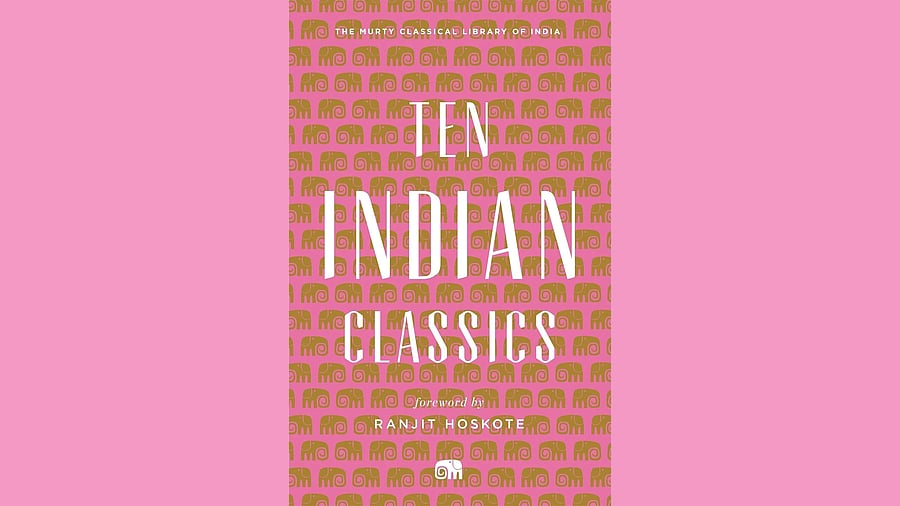
Ten Indian Classics.
By Aparna Krishnan and Rohan Murty
By the end of 2025, the translation series, a project undertaken by the Murty Classical Library of India (MCLI), which has just completed 10 years, will comprise 50 bilingual volumes drawn from 14 languages spanning 25 centuries, and edited by dozens of scholars around the globe; more than 80 universities are involved as well. Those numbers read like statistics but serve as open doors into our past.
Why should Indians step through? A civilisation that knows its own library meets the future without cultural stage fright. The classics strengthen ethical and emotional intelligence as coding boot-camps build computational skill, and the record they preserve is spectacularly plural — an antidote to the brittle simplicities that masquerade as nationalism.
Listen first to the earliest voices. Poems of the First Buddhist Women — the Therigatha in Pali — let today’s teenager overhear nuns from the fifth century BCE grumbling about jackfruit, yearning for enlightenment, sharing their difficult choices. Feminist candour, it turns out, is not a recent import. A few books along sits Sur’s Ocean, where Surdas turns Braj Hindi into boundless tenderness, imagining god as a mischievous child even Krishna’s mother cannot manage.
Spiritual pluralism deepens in Punjab and Sindh. Sufi Lyrics shares Bullhe Shah’s ecstatic Punjabi refrains, while poems from the Sikh Sacred Tradition gather hymns from Guru Nanak, each insisting the divine ignores the fences humans raise. A reader moving between them learns — without a civics lecture — how this sacred tradition champions a language of universal love and critiques hate as a basis for spiritual understanding.
Epic imaginations prove equally many-voiced. In The Sea of Separation, Tulsidas retells the Ramayana as an Awadhi love poem stretched across a cosmic ocean; The Kannada Mahabharata offers a unique lens on the epic, emphasising Krishna’s wisdom and critiquing societal structures, but ultimately culminates in the inevitable and tragic Kurukshetra War; Kalidasa’s Lineage of the Raghus pauses mid-hunt so a king can spare a frightened doe. Each version remixes a shared pool of story. Tomorrow’s engineers and filmmakers who splice myths with science fiction will merely be extending a classical habit. Imagination wanders further in Theft of a Tree, a 16th-century Telugu caprice where a lovelorn god uproots paradise for his bride. Pair it with God at Play, a Marathi chronicle of wandering saints who debate metaphysics at roadside shrines, and with Mir Taqi Mir’s Urdu Ghazals, whose self-mocking urban voice could headline any open-mic night. Future song-writers, stand-up comics and game designers will find proof here that Indian languages have never lacked irony or interstellar whimsy. The shelf also houses tough lessons in power. Eight monumental volumes of Abu’l-Fazl’s History of Akbar record how an early-modern empire tried to turn pluralism into policy: censuses, provincial audits, debates among Jesuits, Jains and Shia clerics. Read beside the Sanskrit Yajnavalkya Smrti, where law is argued clause by clause, the chronicle shows a tradition of evidence-based governance long before the phrase existed. Business schools seeking case studies could start here rather than in Silicon Valley.
For sceptics, there is Ten Indian Classics, a tasting menu that places Pali nun, Persian historian, Prakrit romance, Kannada trickster and Urdu lyric in one slim volume. What can all this give a century psyched for AI and space? These books train the social faculties algorithms cannot emulate; they remind inventors that risk and wonder are native instincts; they hold alternative blueprints for community, power and desire. Leave the shelf unopened, and the next generation inherits a thinner vocabulary for thinking about freedom or beauty. Read it — better still, argue with it — and young minds grow elastic, confident, resistant to dogma.
MCLI began as a publishing project, but it has become a wager on cultural confidence. Fifty volumes in, 90 years to go. If teachers add one title to a syllabus, if grandparents gift one at a birthday, if a line of Sindhi or Sanskrit slips into a pop song, the wager will pay off. Then, on the library’s 100th birthday, a child will browse a catalogue and think: of course these are my books, as natural as Shakespeare, as necessary as the morning news. Classics are not relics; they are engines. Fed with attention, they generate the imaginative power a republic needs.
The Heritage Shelf is a new monthly column from the Murty Classical Library of India, published by Harvard University Press, presenting India’s greatest literary works and the enduring traditions that shaped them. This is the introductory article.